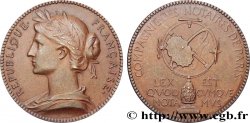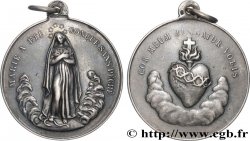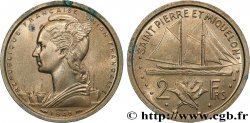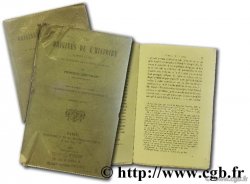Back 1/1
fme_586578 - III REPUBLIC Médaille parlementaire, Auguste Louvet
Not available.
Item sold on our e-shop (2023)
Price : 470.00 €
Item sold on our e-shop (2023)
Price : 470.00 €
Type : Médaille parlementaire, Auguste Louvet
Date: 1871
Mint name / Town : 37 - Indre-et-Loire
Metal : silver
Diameter : 51 mm
Orientation dies : 12 h.
Weight : 64,21 g.
Edge : lisse + corne ARGENT
Puncheon : corne ARGENT
Rarity : R3
Coments on the condition:
Cette médaille présente de hauts reliefs et est recouvert d’une patine grise de médaillier. Traces d’un léger et ancien nettoyage au revers
Obverse
Obverse legend : REPUBLIQUE - FRANÇAISE.
Obverse description : Faisceau de licteur duquel sort une main de justice, entouré de deux cornes d’abondance ; à l’exergue MDCCCLXXI, le tout dans une couronne de chêne.
Reverse
Reverse legend : ASSEMBLÉE NATIONALE // MR LOUVET / (SEINE).
Reverse description : Légende circulaire et gravée en deux lignes horizontales dans une couronne de chêne.
Commentary
Médaille attribuée en 1871 à Auguste Athanase Louvet en tant que Député de la Seine (2e arrondissement). Faisons remarquer que cette médaille attribuée en 1871 a été réalisée après 1880 comme le laisse supposer le poinçon visible sur la tranche de notre exemplaire.
Auguste Athanase Louvet naquit le 16 juillet 1809 à Paris et y décéda le 11 février 1876. En 1857 il devint juge de commerce, puis en 1860 président du tribunal de Comme de la Seine. Il fut également maire du 2e arrondissement de Paris de 1859 à 1863. Il n’exerça qu’un seul mandat de député du 2 juillet 1871 au 7 mars 1876. Il siégeait au centre gauche sur le bancs des Républicains conservateurs.
Medal awarded in 1871 to Auguste Athanase Louvet as Deputy of the Seine (2nd arrondissement). Note that this medal awarded in 1871 was made after 1880 as the hallmark visible on the edge of our example suggests. Auguste Athanase Louvet was born on July 16, 1809 in Paris and died there on February 11, 1876. In 1857 he became a commercial judge, then in 1860 president of the court of Comme de la Seine. He was also mayor of the 2nd arrondissement of Paris from 1859 to 1863. He only served one term as deputy from July 2, 1871 to March 7, 1876. He sat on the center-left benches of the Conservative Republicans
Auguste Athanase Louvet naquit le 16 juillet 1809 à Paris et y décéda le 11 février 1876. En 1857 il devint juge de commerce, puis en 1860 président du tribunal de Comme de la Seine. Il fut également maire du 2e arrondissement de Paris de 1859 à 1863. Il n’exerça qu’un seul mandat de député du 2 juillet 1871 au 7 mars 1876. Il siégeait au centre gauche sur le bancs des Républicains conservateurs.
Medal awarded in 1871 to Auguste Athanase Louvet as Deputy of the Seine (2nd arrondissement). Note that this medal awarded in 1871 was made after 1880 as the hallmark visible on the edge of our example suggests. Auguste Athanase Louvet was born on July 16, 1809 in Paris and died there on February 11, 1876. In 1857 he became a commercial judge, then in 1860 president of the court of Comme de la Seine. He was also mayor of the 2nd arrondissement of Paris from 1859 to 1863. He only served one term as deputy from July 2, 1871 to March 7, 1876. He sat on the center-left benches of the Conservative Republicans








 Report a mistake
Report a mistake Print the page
Print the page Share my selection
Share my selection Ask a question
Ask a question Consign / sell
Consign / sell
 Full data
Full data















